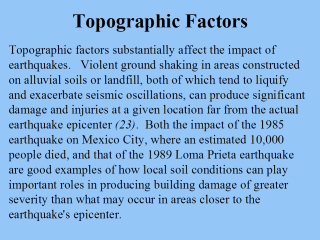 |
Meteorological factors Meteorology
plays only a minor direct role in the events that initiate earthquakes. However, it can
substantially affect the secondary effects of earthquakes. High tides and high water
levels from storm runoff exacerbate the impact of seismic sea waves. Water saturation of
soils increases the likelihood of landslides, avalanches, and earthen dam failures, as
well as the probability of soil liquefaction during seismic shaking. Earthquake-induced
failure of dams when streams are near flood stage would be catastrophic. If housing is
substantially damaged, rain or subfreezing temperatures would be, at the least, a nuisance
and could contribute substantially to morbidity and mortality, as such conditions did
following the December earthquake in mountainous Armenia in 1988. |
